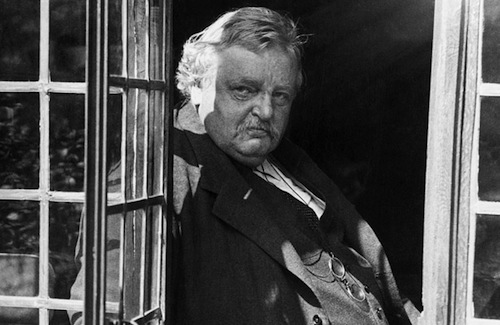I was wandering through Facebook and noticed a quote by G.K. Chesterton at the top of someone’s profile. The quote was exceptionally stupid. And I thought to myself, So many people repeat these little quips, and so many of them are awful. So I decided to start a collection. I made it through the first two pages (of sixteen) devoted to Chesterton on a popular quotation website. Here are a few of the stupidities I found:
- “People wonder why the novel is the most popular form of literature; people wonder why it is read more than books of science or books of metaphysics. The reason is very simple; it is merely that the novel is more true than they are.”
By this logic, the works of E.L. James must be extremely true.
- “One sees great things from the valley, only small things from the peak.”
One sees small things from the valley, but only at the peak can one see the greatness of which they form a part.
- “Love means to love that which is unlovable; or it is no virtue at all.”
Love means to love what is worthy of love; everything else is vice.
- “Without education, we are in a horrible and deadly danger of taking educated people seriously.”
Maybe it’s because Chesterton wasn’t educated that he believed this, but I find that educated people tend to take each other much more seriously than uneducated people take them. People with college degrees don’t tend to call intellectuals “egg heads.”
- “There is the great lesson of ‘Beauty and the Beast,’ that a thing must be loved before it is lovable.”
This is basically a Sartrean thesis: The will by choosing to love something endows it with the value which makes it capable of being loved. I don’t think I need to explain how pernicious this thought is, since we all know from Thomas “ quia bonum intellectum est obiectum voluntatis.”
- “A good novel tells us the truth about its hero; but a bad novel tells us the truth about its author.”
Is this really true? I mean, doesn’t any novel good or bad tell us something about its author? Are bad novels distinctly good at saying something about the people who write them? It doesn’t seem to be the case at all.
- “Poets do not go mad; but chess-players do. Mathematicians go mad, and cashiers; but creative artists very seldom. I am not, as will be seen, in any sense attacking logic: I only say that this danger does lie in logic, not in imagination.”
Poets go mad quite often, and they seem much more frequently to end up totally absorbed in their own creative “genius” and independence than chess players. Maybe the fault is in imagination and not in logic. Or maybe the idea of ascribing some intrinsic danger to either of these faculties is idiotic.
- “A woman uses her intelligence to find reasons to support her intuition.”
This is objectionable on a few different grounds. First off, it sounds (and probably is) misogynistic. Second, this misogyny makes little sense given his antipathy toward “logic,” stated elsewhere. Third, isn’t this true of everyone, and not just women?
- “The poet only asks to get his head into the heavens. It is the logician who seeks to get the heavens into his head. And it is his head that splits.”
Blessed are the logicians who seek to get heaven into their heads, for by the light of glory their heads will be transformed! But woe to the poets who try to insert themselves into the heavens; eternal perdition awaits them.
- “To love means loving the unlovable. To forgive means pardoning the unpardonable. Faith means believing the unbelievable. Hope means hoping when everything seems hopeless.”
It is all too easy to utter a contradiction with a clever-sounding air and fool one’s audience into thinking you’ve been profound.
- “He may be mad, but there’s method in his madness. There nearly always is method in madness. It’s what drives men mad, being methodical.”
Prudence is right reason concerning things to be done. God’s prudence is called providence, and by it he governs the universe, assigning to each thing its appropriate time.
- “Tolerance is the virtue of the man without convictions. ”
Tolerance is the virtue of a man who is sympathetic with those who are wrong, because he knows how difficult their lot is.
You have a decision to make: double or nothing.
For this week only, a generous supporter has offered to fully match all new and increased donations to First Things up to $60,000.
In other words, your gift of $50 unlocks $100 for First Things, your gift of $100 unlocks $200, and so on, up to a total of $120,000. But if you don’t give, nothing.
So what will it be, dear reader: double, or nothing?
Make your year-end gift go twice as far for First Things by giving now.



